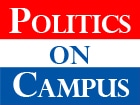Election 2008
By Hannah McDonald-Moniz
Unigo Campus Rep at Princeton
November’s Presidential election is quickly approaching, and Princeton students are working hard to stimulate discussion about the issues steering this year’s election. These efforts have largely been galvanized by the recent economic crisis and political debates, both of which have gotten students on both sides of the fence talking. “I think this election has cut through the usual student apathy,” said Evan Thomas of Newsweek, professor of journalism teaching JRN 400: Media in America, this semester.
The Princeton USG (Undergraduate Student Government) recently sponsored bipartisan debate watching parties for the Vice Presidential and Presidential debates, both with successful turnouts. “They’re must-watch TV for every American,” said Brian N., a junior politics major who interned this past summer for a national news magazine. So many students have been watching that politics has become a regular dinner table conversation at Princeton along with The Office and Gossip Girl. This is a big step on a campus where students have traditionally kept their political beliefs private.
Many have expressed weariness with the never-ending politics, which have not been the departure they had hoped for from the usual political low blows. “I sense a little disappointment [from my students] that this fall has seen a return to politics as usual—the usual low road attacks, pettiness, and evasions,” said Professor Thomas. “I have been disappointed in the lack of ‘debating’ in these debates,” added Brian N. It is perhaps this apprehension toward “politics as usual” that has inspired many students to get involved on a smaller scale through issues-related groups.
One of the foremost issues on students’ minds, unsurprisingly, is the economy. “It has repercussions on our futures,” said junior Brian N., “a lot of seniors have had to scramble for new job plans, and it’s obvious that the job market is going to be very tough for my class when we graduate.” With so many concerned students looking toward Wall Street, senior James Coan decided to take action, starting the project “I Could Be McCain’s Econ 101 Teacher.”
Coan’s project started out small. He was shocked by McCain’s 2007 quote, which helped inspire the group’s creation—“The issue of economics is not something I’ve understood as well as I should.” He got the idea of a student teaching another student (acting as John McCain) Econ 101, and began to stage this act publicly in front of the Frist Campus Center. Though Coan is an Obama supporter, he said the message of his campaign is foremost that “McCain is unprepared to handle the economy in these tumultuous economic times, and it’s quite scary that he knows less about the economy than [undergrads].”
Coan also hopes to raise awareness and increase voter turnout. His effort has grown, and the Econ 101 lessons can be seen every afternoon in front of Frist. The group has also created a website,
www.teachmccainecon101.com, and t-shirts, featuring the quote that inspired his effort. Coan plans to continue his efforts, considering the issue so important that he has chosen to “completely forget about my thesis until after the election.”
The economy is not the only issue on students’ minds, however, as many are concerned about the environment, on a world, national, local, and even campus-wide level. Visiting journalism professor Peter Maass, of the New York Times, is teaching a writing seminar, JRN 449: The Journalism of Energy and Global Warming, and cited his students as “very engaged,” and “looking outward to the world.” Concern over the environment and global warming is one echoed by Andrew Eil, Grad Student ’09, co-chair of Princeton SURGE (Students United for a Responsible Global Environment).
Eil’s group, founded in fall 2006, primarily focuses on awareness, and has not put its support behind a particular candidate this election season. “We try not to be polarizing,” Eil said, “but rather engage groups in dialogue and constructive collaboration.” SURGE’s goal, according to their brochure, is to “[mobilize] the Princeton campus to become a national leader in greenhouse gas emissions reduction.” The group holds weekly meetings, hosts lectures in order to keep up discussion (an upcoming speaker is New Jersey Representative Rush Holt), and endorses many campus energy saving campaigns. This year, Eil said, the group is beginning a dialogue on offshore wind farms, including the potential for Princeton to build, support, or sponsor one such farm.
From Wall Street to wind farms, Princeton students are getting involved this fall, whether working alongside a group, taking a politically-minded course, or just participating in post-debate discussion. Awareness was a common goal cited by all of the involved students—they want their voices heard, on campus and beyond. Said Coan, “If students see students passionate enough about the election to go outside everyday, they might decide to vote when they otherwise may have stayed at home.”

